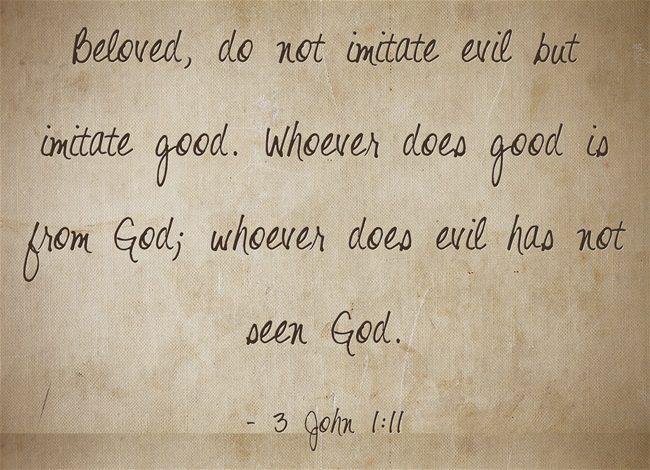Why did the Apostle John have to write a 3rd letter to the church, known as the Book of 3rd John?
The Author
The author of the Book of 3rd John is undoubtedly is the Apostle John and was written, like 1st John and 2nd John, somewhere around AD 85-95. This was John’s next to last letter if you believe that the Book of Revelation was written last but changes in the best Bible scholar circles is that the Book of Revelation was written just before the fall of Jerusalem and the temples destruction which could have been written around AD 68.
The Purpose
It appears that the Apostle John has more than one purpose in writing 3rd John. For one thing, we should be imitators of God meaning we should be imitators of good as John writes, “Beloved, do not imitate evil but imitate good. Whoever does good is from God; whoever does evil has not seen God” (3rd John 1:11). In John 1:11, the apostle refers back to his first letter to the church (1st John) where he wrote that “it is evident who are the children of God, and who are the children of the devil: whoever does not practice righteousness is not of God, nor is the one who does not love his brother” (1st John 3:10).
The Focal Point
The Apostle John writes in 3rd John much like he did in 1st and 2nd John, writing “you know that our testimony is true” (3rd John 1:12). By now they had already heard John’s first letter where he wrote; “I write these things to you who believe in the name of the Son of God that you may know that you have eternal life” (1st John 5:13). It was necessary that John had to write “I have written something to the church, but Diotrephes, who likes to put himself first, does not acknowledge our authority”( 3rd John 1:9) because Diotrephes had obviously been rebelling against the Apostle John’s authority and probably the local church leadership too.
Missing 3rd John?
Perhaps there was a missing original 3rd letter that John wrote which Diotrephes had either intercepted and destroyed or just ignored altogether. It could have been destroyed because if God wanted it to survive to enter into the canon of the Bible, God would have made sure it did. Either way, it was the fact that Diotrephes “likes to put himself first” and even worse, he “does not acknowledge our authority” and that’s a very serious sin because it is the same as rejecting the authority God because God chose John for this purpose. The church knew they could always trust John because he had the testimony of someone who was an eye witness to the sinless, Lamb of God being crucified, Who bled and died, and rose again. Being an eye witness of Jesus, the church knew that his “testimony is true,” regardless of what Diotrephes says.
Conclusion
The Apostle John was concerned about the church like a father would be for their own child and he often referred to them as his children (2nd John 1:1). John is one of the more prolific writers in the New Testament having written the Gospel of John, the Book of Revelation, and 1st, 2nd, 3rd John. They all pointed to Christ and contained eye witness testimony because John was with Christ and he beheld His glory and saw that the “the Word became flesh and dwelt among us, and we have seen his glory, glory as of the only Son from the Father, full of grace and truth” (John 1:14) and so John can say with absolute assurance, “this is the testimony, that God gave us eternal life, and this life is in his Son. Whoever has the Son has life; whoever does not have the Son of God does not have life” (1st John 5:11-12).
Article by Jack Wellman
Jack Wellman is Pastor of the Mulvane Brethren Church in Mulvane Kansas. Jack is also the Senior Writer at What Christians Want To Know whose mission is to equip, encourage, and energize Christians and to address questions about the believer’s daily walk with God and the Bible. You can follow Jack on Google Plus or check out his book Teaching Children the Gospel available on Amazon.















